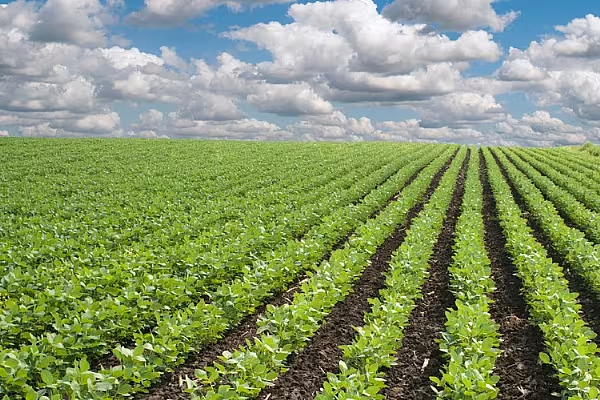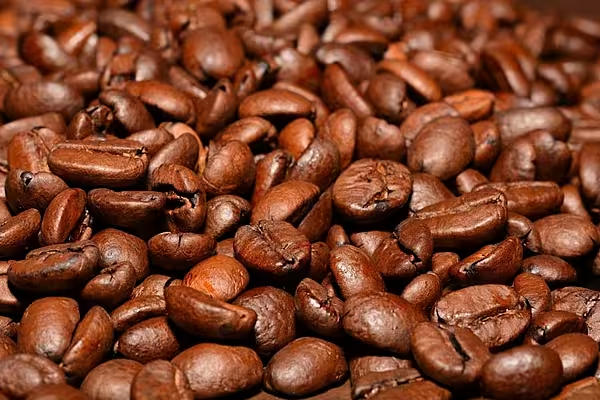Brazilian farmers are discovering a downside to becoming one of the world’s top producers of soybeans: they’re running out of room to store all the unsold supply.
The biggest harvest in the country’s history is poised to leave domestic inventories at a record, data from the processors’ group Abiove show. Local prices to growers are down 29% from a year earlier, so farmers are stashing soybeans anywhere they can rather than sell, which is creating a storage crunch at grain bins just as Brazil’s record corn crop arrives.
“Warehouses are still full of soybeans while farmers start the winter-corn harvest,” said Nelson Antonini, a grower who sits on the board of Copasul, the 800-member farm cooperative in the municipality of Navirai, in the state of Mato Grosso do Sul. “We’ve been facing storage problems.”
So far, Copasul farmers have sold about 50% of their soybean production, well below the 80% they’d normally have unloaded by now, Antonini said. There’s only enough local storage capacity to stockpile 40%. To make room for new arrivals of corn, growers have taken 42,000 metric tons of soybeans out of storehouses and put them into plastic silo bags.
Crop Crisis
Similar problems are showing up across Brazil as harvests in the Southern Hemisphere come to a close. Most of the soybean crop is collected from February through May. While Brazil trails only the US as a producer, it exports more of the oilseed than any other country. Soybeans are crushed to make vegetable oil and animal feed.
What’s compounding the supply crunch is that the country will also reap a record corn crop, which may surpass 100 million tonnes for the first time, according to local forecasters. The first of two crops arrives in March, followed by a second harvest completed by the end of September. Brazil is the world’s third-largest grower and second-biggest exporter of the grain, behind the US.
Farmers in the South American country collected about 114 million tonnes of soybeans this season, up 18% from a year earlier, the US Department of Agriculture estimated last month. US output and inventories also have been rising. While global output probably is headed lower over the next year, global reserves on October 1 will be 21% higher than a year earlier at a record 93.2 million tonnes, the USDA estimates.
Brazil probably can stockpile about 65% of its total grain and oilseed output, according to data from Conab, the agency within the Ministry of Agriculture responsible for supply and demand forecasts.
Storage Capacity
“We’ve seen a great number of farmers ordering silo bags to store corn in Mato Grosso,” said Frederico Azevedo, a manager at Aprosoja, the state’s farmers group.
The big, white bags can hold about 180 tonnes of grain, keeping the contents mostly dry and protected from damage by weather or pests. They’re used widely in neighboring Argentina, but haven’t been common in Brazil until now.
That’s partly because plunging prices are discouraging harvest-season sales, forcing farmers to hold onto supply longer. In Mato Grosso, the biggest soy-growing state, the crop fetched 51.76 reais ($15.67) per 60-kilogram bag in the municipality of Sorriso on July 3, down from 72.84 reais a year earlier, according to data from Cepea, a research unit of the University of Sao Paulo school of agriculture.
Corn isn’t any better. Prices in Sorriso have tumbled 50% to 11.42 reais per 60-kilogram bag. That’s below the government-set minimum of 16.50 reais.
“If they had to choose between saving the soy or corn, they’re likely to prioritize corn sales and hoard the beans,” said Luiz Fernando Roque, an analyst at agricultural consultant Safras & Mercado. “Farmers don’t want to sell at current prices.”
Soy futures on the Chicago Board of Trade have fallen 2.3 percent this year, closing at $9.8075 a bushel on Monday. Corn is up 10 percent at $3.885 a bushel.
Weather Bet
Farmers are betting that soybean prices may improve as US crops face weather risks during their growing season, which culminates in August when plants need rain to fill pods with beans, Roque said. A rebound is less likely in corn because there is such a big surplus of the grain, he said.
Farmers probably will have sold about 62% of their crop by early July, well below the five-year average of 80%, Roque said on June 29.
Also, because Brazil exports far more soy than corn, the market for the oilseed is easier to trade in, according to Andre Debastiani, a partner at Agroconsult. The country will account for about 43% of the world’s soybean exports, compared with about 21% in corn, USDA data show.
Corn prices probably will drop further because farmers prefer selling it and holding soy, Debastiani said at a crop tour last month.
Fewer Exports
It also may mean fewer foreign sales of soybeans than initially forecast, according to Lucas Brunetti, an analyst at Pine Research. Shipments probably will total 59 million tonnes this season, down from an earlier forecast of 61 million, while corn sales will be 30 million tonnes, up from a previous estimate of 27 million, he said.
“The outlook for Brazil’s soy exports was more optimistic months ago," Brunetti said.
Brazil’s winter-corn crop is known as “safrinha,” the second and largest of the two corn harvests. The crop is sown on the same land as recently harvested soybeans, and farmers have become more dependent on it for extra revenue every year.
“Brazilians will probably keep hoarding the soy,” Brunetti said. “Beans are farmers’ main breadwinner.”
News by Bloomberg, edited by ESM. Click subscribe to sign up to ESM: The European Supermarket Magazine.














